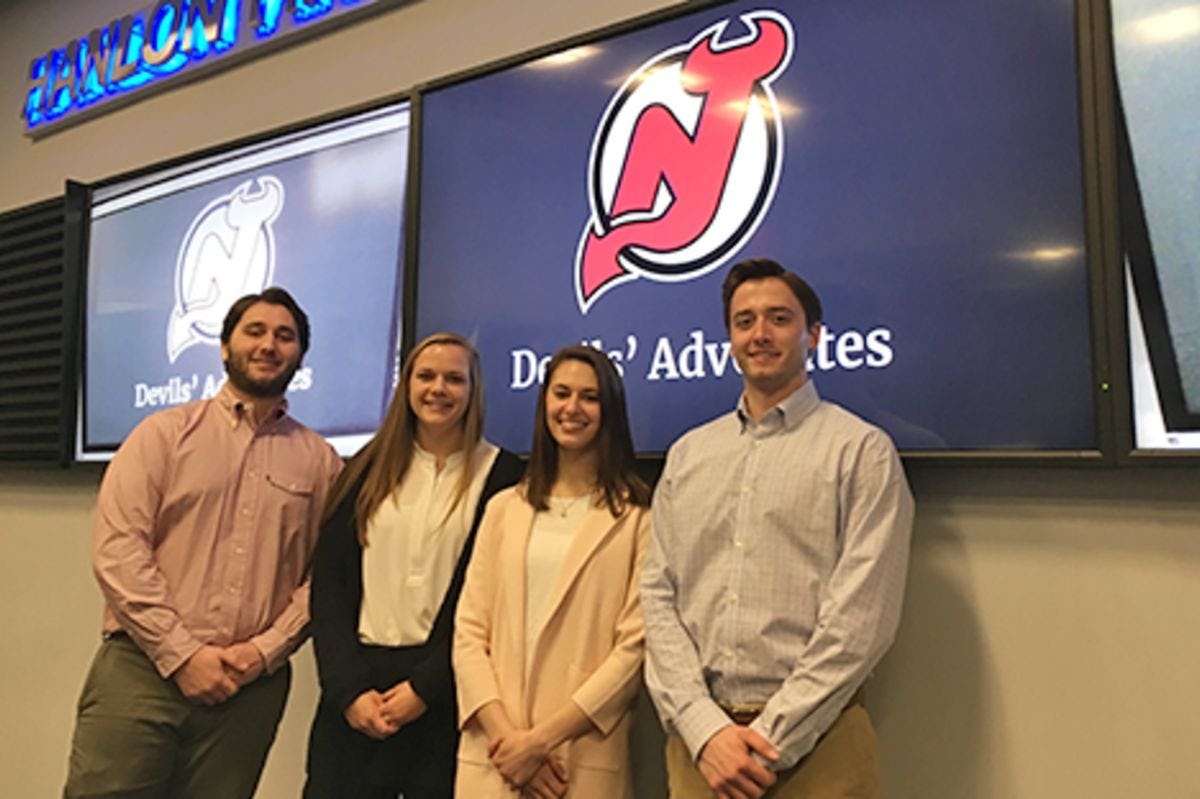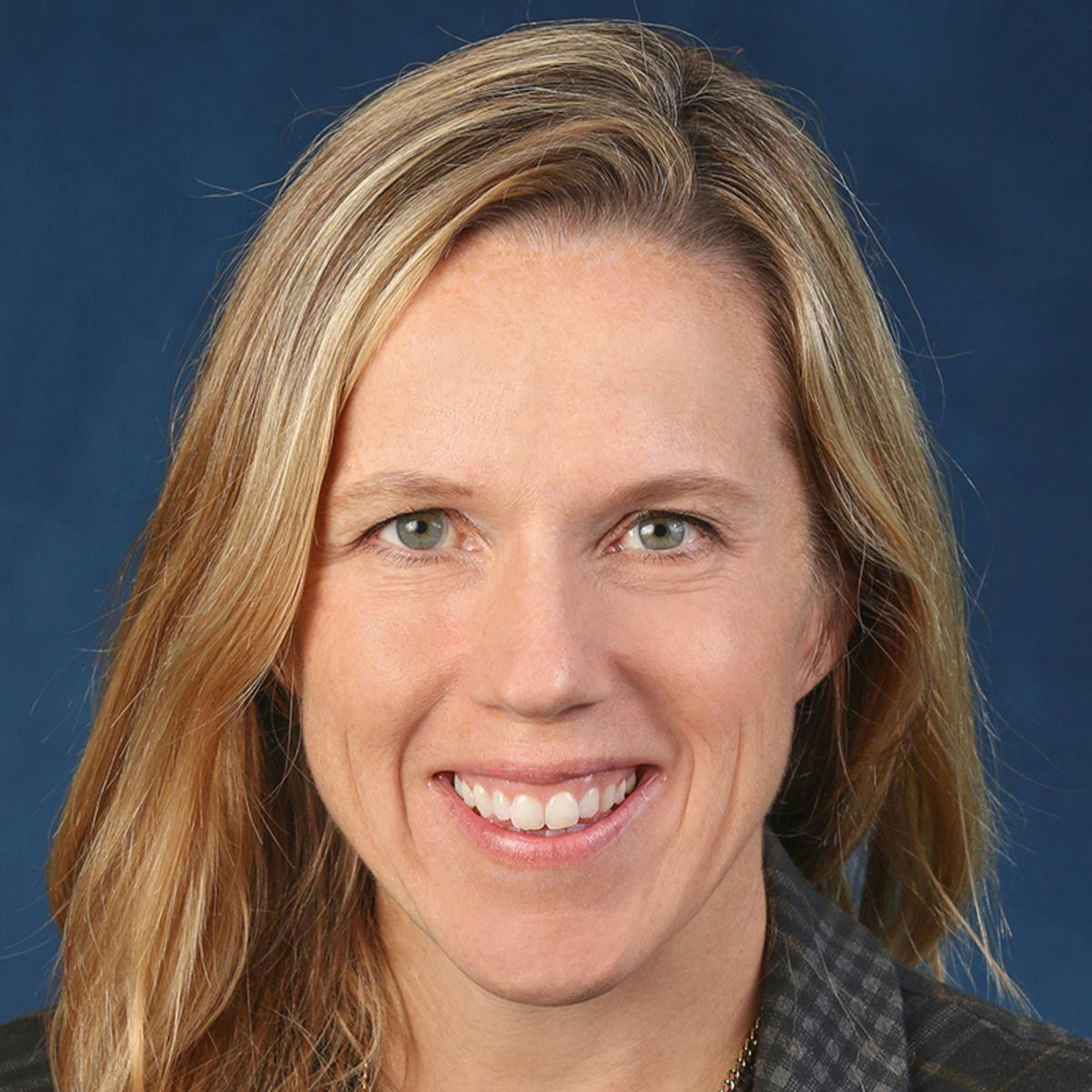Devils in the Details: Stevens Students' Analytical Insights Help Hockey Team Leverage Survey Data
Working with Top Leadership, Seniors Created Recommendations to Improve Ticket Sales
When they watched the New Jersey Devils come from behind to defeat the Arizona Coyotes, 4-3, in an Oct. 26 home game, it was the first time Ayden Canavos, Taylor Tonkinson, Samantha Mount and Christian Werlau visited the Prudential Center.
Like most visitors to downtown Newark’s hockey arena, it wouldn’t be their last.
The team of business students at Stevens Institute of Technology is completing a data-intensive consulting project on behalf of the Devils that’s intended to help the team drive ticket sales among college students, creating lifelong fans in the process.
“At our first meeting, the big thing the Devils stressed is once they get people to the Prudential Center once, they want to come back,” said Mount, a Business & Technology major who accepted has a full-time position with Protiviti’s financial advisory team in Boston. “So if we could get college students to attend their first event at the Prudential Center, they would purchase tickets again.”
That’s where the team’s Puck Midterms concept came from. The students hoped to promote the event during midterms week as a stress-reliever for their peers — and said the team’s director of digital and social media loved the concept — but being students themselves, were unable to pull it off amid their own exam schedules.
The Stevens team also came up with other ideas that impressed Devils executives, including the concept of a relationship manager who would maintain connections and be a point of contact for group ticket sales or other events with students ambassadors at New Jersey universities. To quantify the success of the program, “we came up with the idea of a code students would use when buying tickets,” said Werlau, a Business & Technology major. “The student ambassador would get rewards, like tickets or gear, based on how often their code was used to buy tickets.”
Emphasizing analytics in business
What really piqued the team’s interest, though, was the ability to work with students who are surrounded in a technology- and analytics-intensive environment. Business classes at Stevens challenge students to think critically about data and how it can be used to frame problems and make recommendations.
The Stevens team surveyed a number of college students to get its own background information, but also got the Devils to share their postgame survey data from the past year — which meant they had data from about 1,400 fans to work with.
“Since we’ve all taken classes in analytics, we’re able to make some insights — but it’s still a lot of data,” Werlau said. “We actually met with three different professors to ensure we got the most out of this data.”
The students have been doing histograms, discovering significant variables and finding correlations between different survey questions, and ultimately would like to create a regression analysis model with that data, to see which variables affect ticket sales, and to what degree. That work will be presented at the May 2 Innovation Expo on the Stevens campus.
Executives with the Devils, including their chief financial officer, have been impressed with the team’s findings. The hardest step, the students said, was making inroads with the team, but were able to do so thanks a connection through Dr. Ann Murphy, the project advisor and associate dean of undergraduate business programs at Stevens.
'Every professor has so much experience'
“At Stevens, every professor has so much experience in the world, whether it’s Dean Murphy who has done countless consulting projects, or Professor Jim Biagi, who’s a tax whiz and legal expert, or Dr. Don Lombardi, who’s got every story in the book,” Canavos, a Finance major, said. “The faculty here at Stevens don’t just give us an academic look at things, they give us a real-world look at things.”
Dr. Murphy helped arrange the introduction, but the team still struggled to stay on executives’ radar. Fortunately, their classes prepared them for that, too, said Tonkinson, a Finance major who will work in corporate analysis at JPMorgan in July.
“One thing I learned through Stevens is you need to vouch for yourself, you need to stick your neck out,” she said. “It’s OK to swallow your pride and email them few times. We’ve had to learn how to do that in a professional way to keep our conversations going.”
The experience of working with the Devils has several members of the team interested in considering a career in sports business, including Canavos and Werlau, who both have done internships in finance but are now exploring consulting work. Each spoke highly of the work environment at the Prudential Center, where presentations to the executives were often followed with lengthy what-ifs as the groups considered new possibilities. Mount said she and her teammates often quickly pivoted as those conversations went on.
That’s another skill the Stevens curriculum emphasizes, Tonkinson said.
“In my upper-level finance classes, most of the time the professor deviates from the syllabus to be able to include current topics in their lectures and our coursework,” she said. “So when there’s something in the news that’s a great learning point for us, we learn to relate that topic to what’s going on firsthand. That’s an incredibly important skill in business.”




